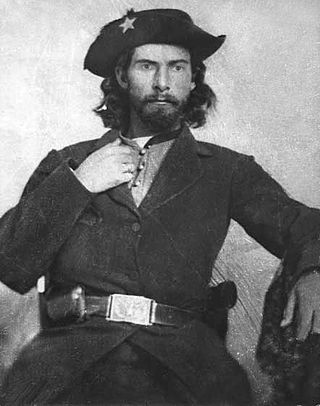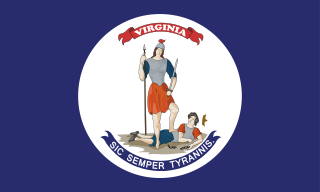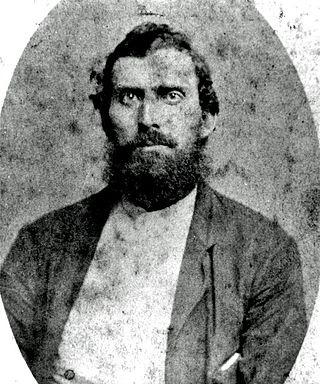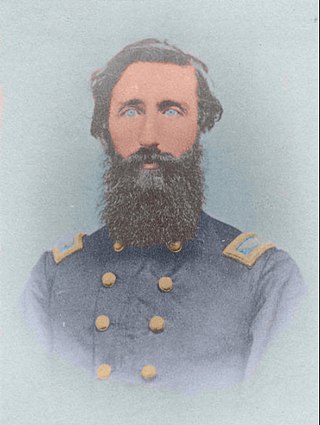Related Research Articles

The Confederate States of America (CSA), commonly referred to as the Confederate States (C.S.), the Confederacy, or the South, was an unrecognized breakaway republic in the Southern United States that existed from February 8, 1861, to May 9, 1865. The Confederacy comprised eleven U.S. states that declared secession and warred against the United States during the American Civil War. The states are South Carolina, Mississippi, Florida, Alabama, Georgia, Louisiana, Texas, Virginia, Arkansas, Tennessee, and North Carolina.

In the American Civil War (1861–65), the border states were slave states that did not secede from the Union. They were Delaware, Maryland, Kentucky, and Missouri, and after 1863, the new state of West Virginia. To their north they bordered free states of the Union, and all but Delaware bordered slave states of the Confederacy to their south.

The U.S. state of West Virginia was formed out of western Virginia and added to the Union as a direct result of the American Civil War, in which it became the only modern state to have declared its independence from the Confederacy. In the summer of 1861, Union troops, which included a number of newly formed Western Virginia regiments, under General George McClellan drove off Confederate troops under General Robert E. Lee at the Battle of Philippi in Barbour County. This essentially freed Unionists in the northwestern counties of Virginia to form a functioning government of their own as a result of the Wheeling Convention. Before the admission of West Virginia as a state, the government in Wheeling formally claimed jurisdiction over all of Virginia, although from its creation it was firmly committed to the formation of a separate state.

Bushwhacking was a form of guerrilla warfare common during the American Revolutionary War, War of 1812, American Civil War and other conflicts in which there were large areas of contested land and few governmental resources to control these tracts. This was particularly prevalent in rural areas during the Civil War where there were sharp divisions between those favoring the Union and Confederacy in the conflict. The perpetrators of the attacks were called bushwhackers. The term "bushwhacking" is still in use today to describe ambushes done with the aim of attrition.
Popular opposition to the American Civil War, which lasted from 1861 to 1865, was widespread. Although there had been many attempts at compromise prior to the outbreak of war, there were those who felt it could still be ended peacefully or did not believe it should have occurred in the first place. Opposition took the form of both those in the North who believed the South had the right to be independent and those in the South who wanted neither war nor a Union advance into the newly declared Confederate States of America.

Alabama was central to the Civil War, with the secession convention at Montgomery, the birthplace of the Confederacy, inviting other slaveholding states to form a southern republic, during January–March 1861, and to develop new state constitutions. The 1861 Alabaman constitution granted citizenship to current U.S. residents, but prohibited import duties (tariffs) on foreign goods, limited a standing military, and as a final issue, opposed emancipation by any nation, but urged protection of African-American slaves with trials by jury, and reserved the power to regulate or prohibit the African slave trade. The secession convention invited all slaveholding states to secede, but only 7 Cotton States of the Lower South formed the Confederacy with Alabama, while the majority of slave states were in the Union. Congress had voted to protect the institution of slavery by passing the Corwin Amendment on March 4, 1861, but it was never ratified.

During the American Civil War, North Carolina joined the Confederacy with some reluctance, mainly due to the presence of Unionist sentiment within the state. A popular vote in February, 1861 on the issue of secession was won by the unionists but not by a wide margin. This slight lean in favor of staying in the Union would shift towards the Confederacy in response to Abraham Lincoln's April 15 proclamation that requested 75,000 troops from all Union states, leading to North Carolina's secession. Similar to Arkansas, Tennessee, and Virginia, North Carolina wished to remain uninvolved in the likely war but felt forced to pick a side by the proclamation. Throughout the war, North Carolina widely remained a divided state. The population within the Appalachian Mountains in the western part of the state contained large pockets of Unionism. Even so, North Carolina would help contribute a significant amount of troops to the Confederacy, and channel many vital supplies through the major port of Wilmington, in defiance of the Union blockade.

The American state of Virginia became a prominent part of the Confederacy when it joined during the American Civil War. As a Southern slave-holding state, Virginia held the state convention to deal with the secession crisis and voted against secession on April 4, 1861. Opinion shifted after the Battle of Fort Sumter on April 12, and April 15, when U.S. President Abraham Lincoln called for troops from all states still in the Union to put down the rebellion. For all practical purposes, Virginia joined the Confederacy on April 17, though secession was not officially ratified until May 23. A Unionist government was established in Wheeling and the new state of West Virginia was created by an act of Congress from 50 counties of western Virginia, making it the only state to lose territory as a consequence of the war. Unionism was indeed strong also in other parts of the State, and during the war the Restored Government of Virginia was created as rival to the Confederate Government of Virginia, making it one of the states to have 2 governments during the Civil War.
Felix Ives Batson was a prominent American lawyer and politician from Arkansas.

The 1st Alabama Cavalry Regiment was a cavalry regiment recruited from Southern Unionists that served in the Union Army during the American Civil War. It was the only predominantly-white Union regiment from Alabama. Of the 2,678 white Alabamians who enlisted in the Union Army, 2,066 served in the 1st Alabama Cavalry.

During the American Civil War, Arkansas was a Confederate state, though it had initially voted to remain in the Union. Following the capture of Fort Sumter in April 1861, Abraham Lincoln called for troops from every Union state to put down the rebellion, and Arkansas and several other states seceded. For the rest of the civil war, Arkansas played a major role in controlling the Mississippi River, a major waterway.

The history of Arkansas began millennia ago when humans first crossed into North America. Many tribes used Arkansas as their hunting lands but the main tribe was the Quapaw, who settled in the Arkansas River delta upon moving south from Illinois. Early French explorers gave the territory its name, a corruption of Akansea, which is a phonetic spelling from the Illinois language word for the Quapaw. This phonetic heritage explains why "Arkansas" is pronounced so differently than the U.S. state of "Kansas" even though they share the same spelling.

In the United States, Southern Unionists were white Southerners living in the Confederate States of America opposed to secession. Many fought for the Union during the Civil War. These people are also referred to as Southern Loyalists, Union Loyalists, or Lincoln's Loyalists. Pro-Confederates in the South derided them as "Tories". During Reconstruction, these terms were replaced by "scalawag", which covered all Southern whites who supported the Republican Party.

During the American Civil War, most of what is now the U.S. state of Oklahoma was designated as the Indian Territory. It served as an unorganized region that had been set aside specifically for Native American tribes and was occupied mostly by tribes which had been removed from their ancestral lands in the Southeastern United States following the Indian Removal Act of 1830. As part of the Trans-Mississippi Theater, the Indian Territory was the scene of numerous skirmishes and seven officially recognized battles involving both Native American units allied with the Confederate States of America and Native Americans loyal to the United States government, as well as other Union and Confederate troops.

James M. Johnson was an American soldier and Arkansas politician. During the American Civil War he was a southern unionist and officer in the Union Army; serving as an aide to multiple generals and later commanded the 1st Arkansas Infantry Regiment (Union), eventually being made a brevet brigadier general. Following the war he would become the 2nd Lieutenant-Governor of Arkansas and later the 10th Secretary of State of Arkansas. During his tenure in Arkansas politics Johnson formed his own faction in the Arkansas Republican Party, which went against the policies of Governor Powell Clayton. The two men later tried to impeach the other on trumped up charges. Though Johnson was never convicted he lost his political support and left politics.

The following outline is provided as an overview of and topical guide to the U.S. state of Arkansas:
White Southerners, are White Americans from the Southern United States, originating from the various waves of Northwestern European immigration to the region beginning in the 17th century. A semi-uniform white Southern identity coalesced during the Reconstruction era partially to enforce white supremacism in the region.
Ted Raymond Worley was an American teacher, historian, editor, cataloguer, and author in the U.S. state of Arkansas. He wrote articles and books.

Edward W. Gantt was an American politician and Confederate soldier who defected to the Union during the American Civil War and was a Freedmen's Bureau agent during Reconstruction. Born in Maury County, Tennessee, in 1829, Gantt was a delegate to the 1850 Nashville Convention, which considered secession. Later in the decade, he moved to Arkansas, which he felt allowed him more opportunities to gain prominence. He spread secessionist rhetoric after the 1860 United States presidential election. He was elected to the United States House of Representatives but did not take his seat. After the outbreak of the American Civil War in 1861, Gantt became the colonel of the 12th Arkansas Infantry Regiment. He was wounded in an artillery duel while his regiment was in reserve at the Battle of Belmont, and in April 1862 was captured when the Confederate defenses of Island Number Ten fell.